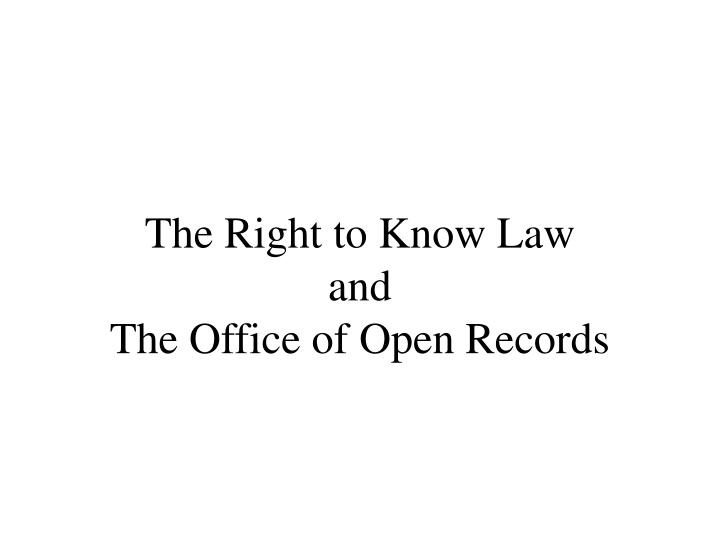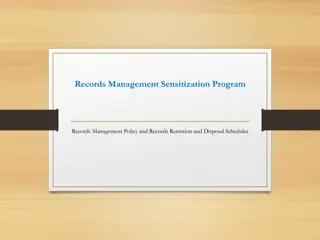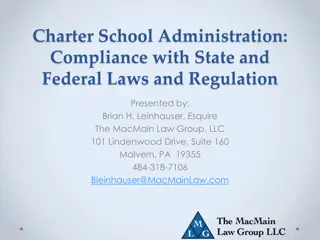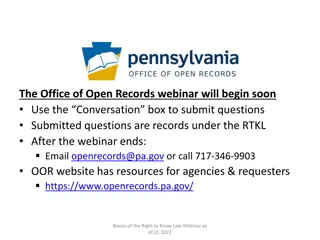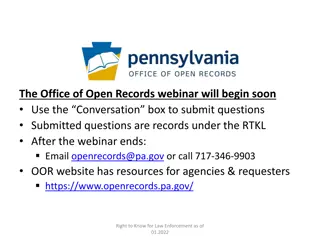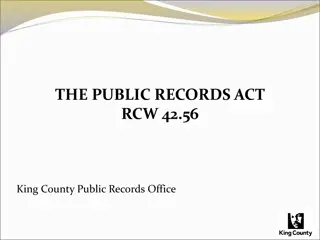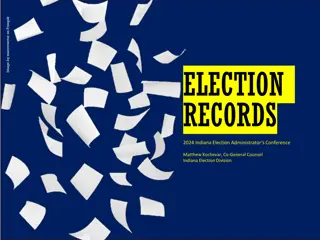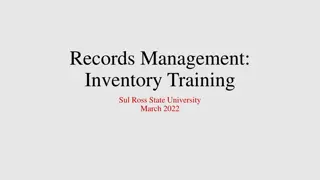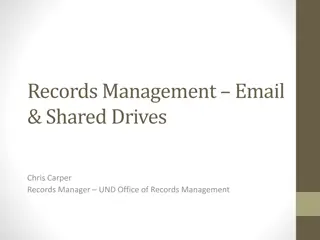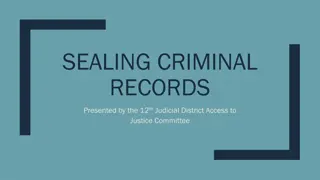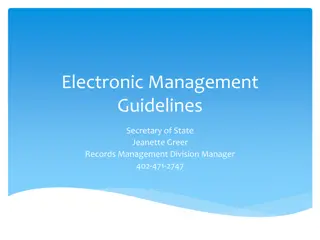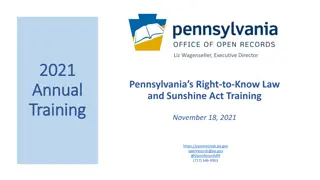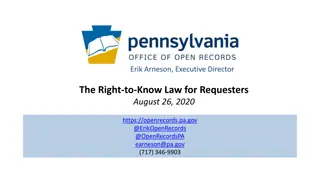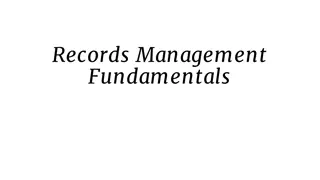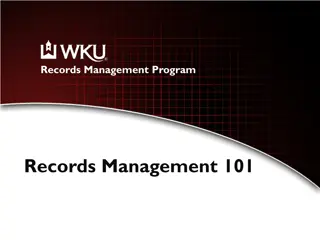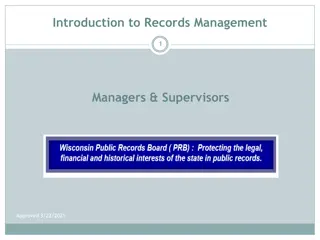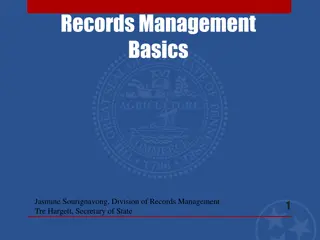The Right to Know Law and Office of Open Records
The Right to Know Law (RTKL) in Pennsylvania grants access to public records held by various agencies, ensuring transparency and accountability. The law applies to Commonwealth, local, judicial, and legislative agencies. Records are presumed to be public but can be exempt under specific conditions. The burden of proof to withhold records lies with the government, and there are exemptions for certain categories of information. Understanding the scope and application of the RTKL is crucial for upholding open governance principles.
Uploaded on Sep 26, 2024 | 3 Views
Download Presentation

Please find below an Image/Link to download the presentation.
The content on the website is provided AS IS for your information and personal use only. It may not be sold, licensed, or shared on other websites without obtaining consent from the author.If you encounter any issues during the download, it is possible that the publisher has removed the file from their server.
You are allowed to download the files provided on this website for personal or commercial use, subject to the condition that they are used lawfully. All files are the property of their respective owners.
The content on the website is provided AS IS for your information and personal use only. It may not be sold, licensed, or shared on other websites without obtaining consent from the author.
E N D
Presentation Transcript
The Right to Know Law and The Office of Open Records
65 P.S. 67.101 et seq. The RTKL applies to: Commonwealth agencies; Local agencies; Judicial agencies; 65 P.S. 67.304 (financial records only); but see Faulk v. Phila. Clerk of Courts, 116 A.3d 1183 (Pa. Commw. Ct. 2015) (common law right of access to judicial filings outside of the RTKL) Legislative agencies 65 P.S. 67.102, .303 (legislative records only).
Records are presumed to be subject to public disclosure. 65 P.S. 67.305 Records which are subject to privilege, legal confidentiality or exempt under the RTKL are not subject to disclosure. 65 P.S. 67.102 (defining public record ) Records must document a transaction or activity of an agency. 65 P.S. 67.102 (defining record )
Transaction or activity of an agency Office of Attorney General v. Phila. Inquirer, 127 A.3d 57 (Pa. Commw. Ct. 2015) (pornographic e-mails on government computers do not relate to agency business even if violative of agency work rules) Mollick v. Township of Worcester, 32 A.3d 859 (Pa. Commw. Ct. 2011) (records stored on personal computers are public records if they document a transaction or activity of an agency)
Records in the possession of public contractors are subject to the RTKL Section 506(d)(1) of the RTKL, 65 P.S. 67.506(d)(1). Public contract must be to perform a governmental function. Governmental function must be a non-ancillary function of the agency. SWB Yankees L.L.C. v. Wintermantel, 45 A.3d 1029 (Pa. 2012). Records must directly relate to the governmental function.
Burden of proof to withhold records is on the government. 65 P.S. 67.708(a)(1). Section 708(b) of the RTKL lists 30 separate exemptions to public disclosure. 65 P.S. 67.708(b). Section confidentiality 67.506(c) (giving agencies discretion to release non-public records). 708(b) of the RTKL is See a not P.S. provision. 65
Section 708(b) Exemptions 1. Loss of federal funds/threat of physical harm or personal security. Threat to public safety. Threat to building or infrastructure security. Threat to computer security. Individually identifiable health information. Personal identification information. Certain employee information except demotion or discharge. Labor relations strategy and negotiations/arbitration. Draft bills, ordinances, resolutions, regulations. 10. Internal, predecisional deliberations of an agency. See McGowan v. Pa. Dep t of Env. Prot., 103 A.3d 374 (Pa. Commw. Ct. 2014) (Purely factual material is not exempt). 2. 3. 4. 5. 6. 7. 8. 9.
Section 708(b) Exemptions 11. Trade secrets/confidential proprietary information. 12. Personal notes and working papers. 13. Certain donor information. 14. Unpublished lectures, manuscripts and articles. 15. Academic transcripts. 16. Records of criminal investigations except police blotter information. See Pa. State Police v. Grove, 119 A.3d 1102 (Pa. Commw. Ct. 2015) appeal pending 133 A.3d 292 (Pa. 2016). 17. Records of non-criminal investigations except the imposition of a fine, civil penalty or other sanction. Pa. Dep t of Pub. Welf. v. Chawaga, 91 A.3d 257 (Pa. Commw. Ct. 2014). 18. Emergency dispatch (911) records except time response logs. 19. DNA and RNA records. 20. Autopsy records except decedent s name and cause and manner of death. But see The Coroner s Act, 16 P.S. 1231 et seq.; Hearst TV v. Norris, 54 A.3d 23 (Pa. 2012).
Section 708(b) Exemptions 21. Draft meeting minutes until the next regular meeting. 22. Appraisals, estimates, reviews or evaluations regarding real estate, the purchase of construction projects until a decision to proceed. 23. Library records of identifiable individuals or groups. 24. Contributions to libraries and museums to the extent imposed by the donor. 25. Locations of archeological sites/threatened species. 26. Procurement proposals prior to the award of a contract. 27. Insurance carrier communications. 28. Records identifying social service recipients. 29. Constituent correspondence with the GeneralAssembly. 30. Name, home address and DOB of minors. supplies and equipment and
Financial Records Financial records include records dealing with receipt or disbursement of public funds or records of an agency s acquisition, use or disposal or property or services. See 65 P.S. 67.102 (defining financial record ). Contracts are financial records. Id.; but see Global Tel Link Corp. v. Prison Legal News, No. 1678 C.D. 2015, 2016 Pa. Commw. LEXIS 400 (Sept. 22, 2016) (attachments to a contract are not automatically financial records). Section 708(b) exemptions do NOT apply to financial records. 65 P.S. 67.708(c). May redact financial records for information exempt from disclosure under Section 708(b)(1) (6), (16), (17). Id. May redact financial records for information protected by privilege. Levy v. Senate of Pa., 65A.3d 361 (Pa. 2013).
Aggregated Data Aggregated data is a tabulation of data relating to broad categories so that its not possible to distinguish properties of individuals within those categories. (defining aggregated data ). See 65 P.S. 67.102 Limited Section 708(b) exemptions apply to aggregated data. 65 P.S. 67.708(d). May withhold aggregated data in its entirety under Section 708(b)(1) (5). Id.
Requesting Records Requests for records must be addressed to the agency open records officer. 65 P.S. 67.703; Commonwealth v. Office of Open Records, 103A.3d 1276 (Pa. 2014). Agencies have 5 business days to respond from the date the request is received by the agency open records officer. 65 P.S. 67.901; Commonwealth v. Donahue, 98 A.3d 1223 (Pa. 2014). Agencies must grant access, deny access or extend the response date by 30 days. 65 P.S. 67.901, .902. Extensions to respond must specify a reason. Id.
Appealing Agency Responses Judicial agencies: appeals officer designated by the judicial agency. 65 P.S. 67.503(b). Legislative agencies: appeals officer designated by the Senate, House and Legislative Reference Bureau, as appropriate. 65 P.S. 67.503(c). Constitutional row offices: appeals officer designated by the respective row officer. 65 P.S. 67.503(d)(1). Local agency criminal investigations: appeals officer designated by the District Attorney. 67.503(d)(2). All other agencies: Office of Open Records. 65 P.S. 67.503(a). 65 P.S.
Misfiled appeals The OOR will transfer misfiled appeals to the appropriate appeals officer. Analogous to transfer of misfiled court appeals. 42 Pa.C.S. 5103(a). Faulk v. Phila. Clerk of Courts, 116 A.3d 1183 (Pa. Commw. Ct. 2015)
Proceedings before the Office of Open Records Arequester may appeal within 15 business days of an agency s final response or the date the request is deemed denied. 65 P.S. 67.1101(a)(1). A request is deemed denied if the agency fails to respond within 5 business days of an agency s open records officer s receipt of the request. 65 P.S. 67.901; Commonwealth v. Donahue, 98A.3d 1223 (Pa. 2014). A request is deemed denied if the agency, after responding within 5 business days, and invoking an extension of time to respond by an additional 30 days, fails to respond by the extended deadline. 65 P.S. 67.902(b)(2).
Proceedings before the Office of Open Records A requester can appeal a denial of access, redactions to records, the sufficiency of a grant of access, the costs of duplication or the requirement to prepay fees. A requester s appeal must address the agency s grounds for denial and state why the requested records are public records. 65 P.S. 67.1101(a)(1); Barnett v. Pa. Dep t of Pub. Welf., 71 A.3d 399 (Pa. Commw. Ct. 2013); Pa. Dep t of Corr. v. Office of Open Records, 18A.3d 429 (Pa. Commw. Ct. 2011). A requester s appeal must include a copy of the request and any agency response, or the OOR will dismiss the appeal if the requester fails to comply with the OOR s order directing their filing.
Proceedings before the Office of Open Records Appeals may be filed in person, by mail, by fax (717-425- 5343), by e-mail (openrecords@pa.gov) or through the OOR s website: (http://www.openrecords.pa.gov/Appeals/AppealForm.cfm). Use the OOR Appeal Form! http://www.openrecords.pa.gov/Documents/Appeals/Appeal_Form.pdf Electronic submissions will be accepted up to 11:59:59 p.m. Paper appeals must be on 8 x 11 or 8 x 14.
Proceedings before the Office of Open Records Appeals are initially reviewed for legal sufficiency, i.e., timeliness, premature, jurisdiction, etc. Appeals packet will be issued to the parties with case management instructions. Appeals without the request or response will have a deficiency order requiring compliance within 7 days or the appeal will be dismissed. The OOR will notify the parties of any compliance. Appeal submissions must be filed within 7 business days. Parties may request the OOR to extend/reopen the record closing date.
Proceedings before the Office of Open Records A person with a direct interest in the requested records may seek to participate before the OOR. 65 P.S. 67.1101(c)(1). The decision of whether to allow third parties to participate before to the OOR rests with the OOR Appeals Officer, 65 P.S. 67.1101(c)(2), and is Pennsylvanians for Union Administration, 129 A.3d 1246, 1263-64 (Pa. Commw. Ct. 2015). subject Reform to their Pa. discretion. Office v. of The OOR will allow third party participation if disclosure would affect a legally-enforceable interest. Id.; see also W. Chester Univ. of Pa. v. Schackner, 124 A.3d 382 (Pa. Commw. Ct. 2015)
Proceedings before the Office of Open Records The parties may agree to mediate the dispute. If the parties agree to mediation, the case is reassigned to a mediator. Mediation tolls the time to issue a final determination. Mediation is confidential. If mediation is unsuccessful, the case is reassigned to an appeals officer with no knowledge of mediation proceedings.
Proceedings before the Office of Open Records Agencies have the burden of proof to withhold records. 67.708(a)(1). 65 P.S. Testimonial affidavits may be sufficient to meet an agency s burden of proof. Brown v. Pa. Dep t of State, 123 A.3d 801 (Pa. Commw. Ct. 2015); Heavens v. Pa. Dep t of Envir. Prot., 65A.3d 1069 (Pa. Commw. Ct. 2013). Unsworn attestations made pursuant to 18 Pa.C.S. 4904 are competent evidence. W. Chester Univ. of Pa. v. Schackner, 124 A.3d 382 (Pa. Commw. Ct. 2015). Affidavits/attestations must be detailed, non-conclusory and submitted in good faith. Office of the Governor v. Scolforo, 65 A.3d 1095 (Pa. Commw. Ct. 2013). Unsworn statements of fact are not competent evidence. See Housing Auth. of City of Pgh. v. Van Osdol, 40 A.3d 209 (Pa. Commw. Ct. 2012) (statements in briefs are not evidence of record).
Proceedings before the Office of Open Records The OOR may order the production of documents for the OOR s in camera review. The OOR has the implied authority to conduct in camera review where the circumstances warrant and the requester has asked for in camera review. Office of Open Records v. Center Twp., 95 A.3d 354 (Pa. Commw. Ct. 2014); see also Office of Open Records v. Luzerne County, No. 373 M.D. 2013 (Pa. Commw. Ct., September 30, 2013). The OOR s authority to order in camera review will be overturned only upon a showing of an abuse of discretion. Office of Open Records v. Worcester Twp., 129 A.3d 44 (Pa. Commw. Ct. 2016); but see Office of Open Records v. Pa. State Police, No. 370 M.D. 2016 (Pa. Commw. Ct., filed Aug. 8, 2016) (unreported) (holding the OOR could not review criminal investigative information under CHRIA).
Proceedings before the Office of Open Records The OOR may hold an evidentiary hearing. 67.1102(b)(2). 65 P.S. The decision to hold or not hold a hearing is not appealable. Id. If a hearing is held, the General Rules of Administrative Practice and Procedure, 1 Pa. Code Part II, apply. 65 P.S. 67.1102(b)(2). Hearings are conducted to resolve credibility issues regarding testimonial affidavits/attestations.
Proceedings before the Office of Open Records The OOR Appeals Officer is required to issue a written final determination within 30 days of the date the appeal is filed or the appeal is deemed denied by operation of law. 67.1101(b)(2). 65 P.S. A requester may agree to extend the due date for the issuance of a final determination. 65 P.S. 67.1101(b)(1). The OOR has an implied power to unilaterally extend the final determination due date in appropriate circumstances. Pa. State Sys. of Higher Educ. v. Ass n of State College and University Faculties, ___A.3d ___, 2016 Pa. Commw. LEXIS 308 (July 6, 2016).
Pa. State Sys. of Higher Educ. v. Assn of State College and University Faculties, ___ A.3d ___, 2016 Pa. Commw. LEXIS 308 (July 6, 2016) The request sought various budget and financial records from all 14 State Universities, and the Universities argued the requests were not sufficiently specific. On appeal to the OOR, the Universities again argued that the requests were not sufficiently specific, but that they may implicate 1.87 million pages of records. On appeal to the Commonwealth Court, the Court found the requests to be sufficiently specific, but also noted that given the large volume of records, the agencies should have been given additional time to review the records and assert any exemptions.
Pa. State Sys. of Higher Educ. v. Assn of State College and University Faculties, ___ A.3d ___, 2016 Pa. Commw. LEXIS 308 (July 6, 2016) [J]ust because an agency claims that it neither has the time nor resources to conduct a document-by-document review within the time period required by the RTKL does not make it so. The agency making the claim has to provide the OOR with a valid estimate of the number of documents being requested, the length of time that people charge with reviewing the request require to conduct this review, and if the request involves documents in an electronic format the agency must explain any difficulties if faces when attempting to deliver the documents in that format. Based on the above information, the OOR can then grant any additional time warranted so that the agency can reasonably discern whether any exemptions apply.
Proceedings before the Office of Open Records The parties may file a Petition for Reconsideration with the OOR within 15 days of the final determination issue date. The OOR will grant a Petition for Reconsideration where there is a potential error of law or evidence not fully considered. Granting the Petition for Reconsideration does not automatically mean the final determination will be reversed. The OOR will not consider evidence that was not filed during the case. Pa. Dep t of Educ. v. Bagwell, 131 A.3d 638, 656 n. 12 (Pa. Commw. Ct. 2016).
Judicial review of OOR final determinations The Commonwealth Court has jurisdiction over appeals from OOR final determinations involving Commonwealth agencies. 65 P.S. 67.1301(a). Commonwealth agencies include: 1) Agencies of the executive branch, 2) Independent agencies, i.e., not subject to control of the Governor, 3) Constitutional row officers, and 4) State-affiliated entities. 65 P.S. 67.102. Appeals of OOR final determinations are subject to Chapter 15 of the Pa. Rules of Appellate Procedure ( Judicial Review of Governmental Determinations ). See also Pa.R.A.P. 1516 (no pleadings allowed other that the petition for review).
Judicial review of OOR final determinations Courts of Common Pleas have jurisdiction over appeals from OOR final determinations involving local agencies in the respective county. 65 P.S. 67.1302(a); see also 42 Pa.C.S. 933(a)(3). Local agencies include counties, cities, boroughs, townships, school districts, municipal authorities, etc. See 65 P.S. 67.102 (defining local agency ). Appeal stays release of records until appeal is resolved. 65 P.S. 67.1301(b), .1302(b).
Manner of taking appeal Appeal may be taken by filing a petition for review or other document as required by rule of court[.] 67.1301(b), .1302(b). Appeals to courts of common pleas are not subject to the Rules of Appellate Procedure. See Pa.R.A.P. 103 (Pa.R.A.P. governs practice and procedure in the Supreme Court, Superior Court and the Commonwealth Court[.] ). See also King v. City of Phila., 103A.3d 1073, 1076 (Pa. Commw. Ct. 2014). Appeals to courts of common pleas are not subject to the Rules of Civil Procedure. In re: Appeal of Borough of Churchill, 575 A.2d 550 (Pa. 1990). Courts of common pleas have discretion to employ rules for practice and procedure provided they do not conflict with existing law. Id. 65 P.S.
Parties on appeal The requester or Commonwealth agency or local agency may appeal OOR final determinations. .1302(a). Third parties do not have a right of appeal under the RTKL; however, due process requires that third parties with a legal interest in the records be permitted to appeal. Bagwell v. Pa. Dep t of Ed., 131 A.3d 638 (Pa. Commw. Ct. 2016); W. Chester Univ. of Pa. v. Schackner, 124 A.3d 382 (Pa. Commw. Ct. 2015). The OOR is not a proper party in an appeal of its final determinations. Padgett v. Pa. State Police, 73 A.3d 644 (Pa. Commw. Ct. 2013); Pa. State Police v. Office of Open Records, 5A.3d 473 (Pa. Commw. Ct. 2010). 65 P.S. 67.1301(a),
Standard and Scope of Review Standard of review is de novo and the scope of review is plenary. Bowling v. Office of Open Records, 75 A.3d 453 (Pa. 2013). Appeals court may make its own findings of fact. Glunk v. Pa. Dep t of State, 102A.3d 605 (Pa. Commw. Ct. 2014). Appeals court may take additional evidence. Pa. State Police v. Grove, 119A.3d 1102 (Pa. Commw. Ct. 2015). Issues not raised before the OOR are waived. Pennsylvanians for Union Reform v. Pa. Office of Admin., 129 A.3d 1246 n.12 (Pa. Commw. Ct. 2015); but see Levy v. Senate of Pa., 94 A.3d 436 (Pa. Commw. Ct. 2014) (noting that where a reviewing court acts as a fact-finder, an agency must raise all challenges before the court closes the evidentiary record).
Record on appeal The record before a court shall consist of the request, the agency s response, the appeal filed under section 1101, the hearing transcript, if any, and the final written determination of the appeals officer. 65 P.S. 67.1303(b). For appeals involving Commonwealth agencies, the OOR is required to file a certified record with the Commonwealth Court within 40 days of receipt of the appeal. Pa.R.A.P. 1952. No similar requirement for the OOR to file a certified record with courts of common pleas; however, courts of common pleas are empowered to issue writs of certiorari. 42 Pa.C.S. 934.
Taking new evidence on appeal A court may rely on the record before the OOR or take new evidence on appeal. See Pa. Dep t of Labor & Indus. v. Heltzel, 90A.3d 823 (Pa. Commw. Ct. 2014)(en banc). Commonwealth Court is generally reluctant to allow agencies to submit additional evidence on appeal that wasn t submitted to the OOR. Pa. State Police v. Muller, 124 A.3d 761 (Pa. Commw. Ct. 2015); Pa. Turnpike Comm n v. Murphy, 25 A.3d 1294 (Pa. Commw. Ct. 2011). Commonwealth Court may take additional evidence where the records implicated law enforcement or security concerns and the record is undeveloped before the OOR. Pa. State Police v. Grove, 119A.3d 1102 (Pa. Commw. Ct. 2015)
Remedies Affirm the OOR in whole or in part. Reverse the OOR in whole or in party Review records in camera. Centre Township, 95A.3d 354 (Pa. Commw. Ct. 2014) See Office of Open Records v. Remand to the OOR for further proceedings. McGowan v. Pa. Dep t of Envir. Prot., 103 A.3d 374 (Pa. Commw. Ct. 2014) (remanding and ordering the OOR to conduct in camera review where record was undeveloped). See e.g.
Further appeal to Commonwealth Court Commonwealth Court has jurisdiction to review final orders of Courts of Common Pleas of appeals taken from government agencies other than Commonwealth agencies. 42 Pa.C.S. 762(a)(4)(ii). The Commonwealth Court s duties are set forth in Chapter 19 of the Pa. Rules ofAppellate Procedure.
Costs and Fees A court may award requesters costs and attorneys fees if the agency acted in bad faith or the defenses to disclosure were not based on a reasonable interpretation of the law. 67.1304(a); Phila. Dist. Attorney v. Bagwell, February Term 2015 No. 01556 (Phila. C.C.P. Dec. 1, 2015) appeal pending No. 2627 C.D. 2015 (Pa. Commw. Ct.); Staub v. Wilkes-Barre et al., No. 8492 of 2012 (Luzerne C.C.P. Oct. 16, 2012) affirmed 77A.3d 724, 2013 Pa. Commw. Unpub. LEXIS 739. 65 P.S. A court may impose a civil penalty if an agency denied access to records in bad faith. 65 P.S. 67.1305(a); Gerson v. Agora Cyber Charter Sch., No. 13-08914 (Del. C.C.P. Oct. 29, 2013). A court may impose a penalty of $500 per day for failure to comply with a court order to disclose public records. 65 P.S. 67. 1305(b).
Enforcing OOR final determinations No specific procedure governing actions to enforce OOR final determinations granting access to records. Petition for Review/Complaint/Mandamus Ledcke v. County of Lackawanna, 28 Pa. D.&C. 5th34 (Lackawanna C.C.P. 2013). The OOR has no authority to enforce a final determination. Arneson v. Wolf, 117A.3d 374, 391 (Pa. Commw. Ct. 2015).
www.openrecords.pa.gov Openrecordspa.wordpress.com http://www.openrecords.pa.gov/EmailSubscrip tions.cfm
